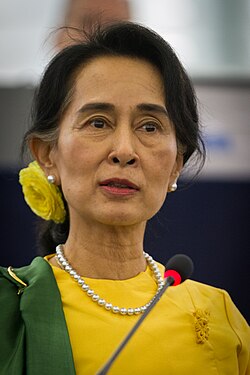| Censorship |
|---|
 |
A political prisoner is someone imprisoned for their political activity. The political offense is not always the official reason for the prisoner's detention.
Contents
- Definitions
- Organizations
- Academics
- Other aspects
- History
- Advocacy
- Notable political prisoners
- Groups
- Individuals
- Notable political prisons
- By country
- See also
- References
- Further reading
- External links
There is no internationally recognized legal definition of the concept, although numerous similar definitions have been proposed by various organizations and scholars, and there is a general consensus among scholars that "individuals have been sanctioned by legal systems and imprisoned by political regimes not for their violation of codified laws but for their thoughts and ideas that have fundamentally challenged existing power relations". [1] The status of a political prisoner is generally awarded to individuals based on the declarations of non-governmental organizations like Amnesty International, on a case-by-case basis. While such statuses are often widely recognized by the international public, they are often rejected by individual governments accused of holding political prisoners, which tend to deny any bias in their judicial systems. [1] [2]
A related term is prisoner of conscience (POC), popularized by Amnesty International. It describes someone who was prosecuted because of their personal beliefs.
Some prisons, known as political prisons, are accustomed to or are designed solely for hosting political prisoners. [3]










